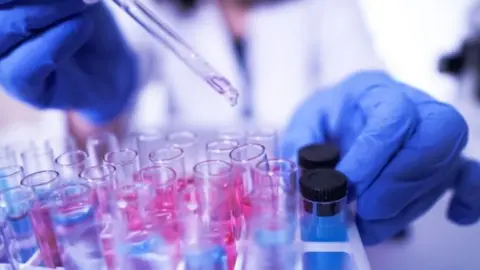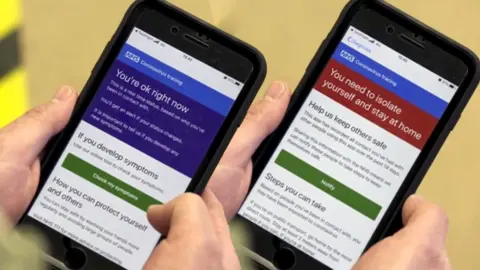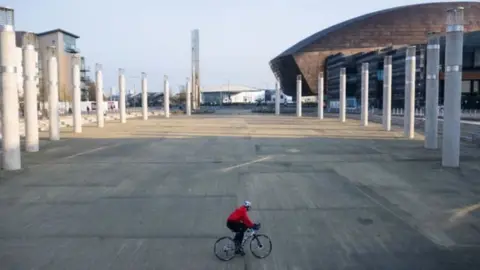Coronavirus: Contact tracing system is launching in Wales
The "test, trace, protect" system is launching in Wales on Monday.
It will see the close contacts of people who have tested positive for coronavirus asked to self-isolate for 14 days.
Similar systems are under way in England, Scotland and Northern Ireland.
It comes on what Health Minister Vaughan Gething called a "big day" with a "significant easing" of the lockdown, so people could see others from another household.
He said he was "proud to be taking choices that are in accordance with our scientific advice."
Under the new rules, people in Wales from two different households will be able to meet outdoors. But they will need to stay in their local area - within five miles as a "general rule" - and remain two metres apart.
Meanwhile the First Minister Mark Drakeford confirmed ministers were not ruling out local lockdowns in response to hotspots discovered by contact tracing.
How will contact tracing work?
Anyone with symptoms of the virus can apply for a home test kit or make an appointment at a drive-through test centre.
An online portal was also made available at the weekend for anyone who has symptoms in Wales to book an appointment.
If you get a positive test, you will be contacted by a contact tracer.
That person will ask for details of all the individual has had contact with while they had had symptoms, Mark Drakeford explained at a press conference on Monday.
Those contacts will then be followed up, and asked to self-isolate for 14 days as a precaution to prevent the virus spreading further.

Who counts as a contact?
At his press conference Mr Drakeford defined contacts as:
- someone you have been within one metre of and had a face-to-face-conversation, had skin-to-skin contact with or have coughed on, or been in other forms of contact for a minute or longer
- someone you have been within two metres of for more than 15 minutes
- someone you have travelled in a vehicle with or sat near on public transport
Will there be a smartphone app?
Contact tracers in Wales will be supported by their own digital systems, which will come online from 8 June and will allow people to provide details of close contacts electronically.
The Welsh Government also plans to use the UK government's NHSX Covid-19 app, which could help with contact tracing by using Bluetooth signals and is being piloted in the Isle of Wight.
Mr Drakeford said they would use it "provided it completes its trial phase satisfactorily".
How many people will do the work?
About 600 staff have been recruited so far for the "test, trace, protect" system, as it has been called in Wales.
Up to 1,000 people will be needed as it is expanded.
Mr Drakeford said he was "confident" the scheme would work with the resources available to it.
"It's a new and major system, and we will learn a lot from the first day or so of it," he said.
He said there would be 600 contact tracers in Wales dealing with "somewhere over" 100 positive tests from the weekend.
Pilots of contact tracing in Wales found that on average every person who had a positive test had five other close contacts, with an average of a half hour conversation needed with each person.
"And when you put all that together, it says to us that we've got the resources in place to deal with the numbers that will come through the system each day this week.

Could there be local lockdowns?
Last week Finance Minister Rebecca Evans said ministers were "not considering differential lockdowns across different parts of Wales".
But on Monday Mr Drakeford said they had not been ruled out.
"We definitely haven't ruled out more precise localised lockdowns if that is what the contact tracing system tells us is happening," he said.
"If there are hotspots, and the best answer is to take particular measures in that area, and that is what we will do and that will be a very ordinary response to a public health problem."
Tracing 'needed before more lockdown changes'
NHS Wales chief executive Dr Andrew Goodall, when asked last week if 600 staff would be enough on Monday, said: "We'll need to get up to a number of 1,000, but we don't need that from the first day."
"We'll expect that number to keep increasing and certainly in line with the demand we expect," he said.
Existing staff with public health experience have been deployed, as more are recruited.
Mr Gething said scientists have advised "that they want that test, trace, protect system to be in place, and to be robust, before further significant adjustments from lockdown are taken. That's the approach we're taking."
He told BBC Wales by the next lockdown review "we'll have more evidence about what we're able to do, and that will give us more confidence about considering further adjustments".

Some local health boards and local authorities have been trialling the new system in recent weeks.
It is anticipated that as many as 20,000 tests a day might be needed in Wales.
Lab capacity in Wales has increased to 9,000 tests-a-day, while people are also able to access the UK-wide home testing scheme.
A greater demand on the system is expected in the autumn and winter, when more people are likely to present with possible symptoms.
Dr Goodall added the testing approach was part of a "set of measures that we need to put in place."
He said: "It's really important to make sure that we still have the ongoing efforts on the ground - the need for example to make sure that we have good infection control both in our hospitals and our care homes, and those mechanisms continue."
